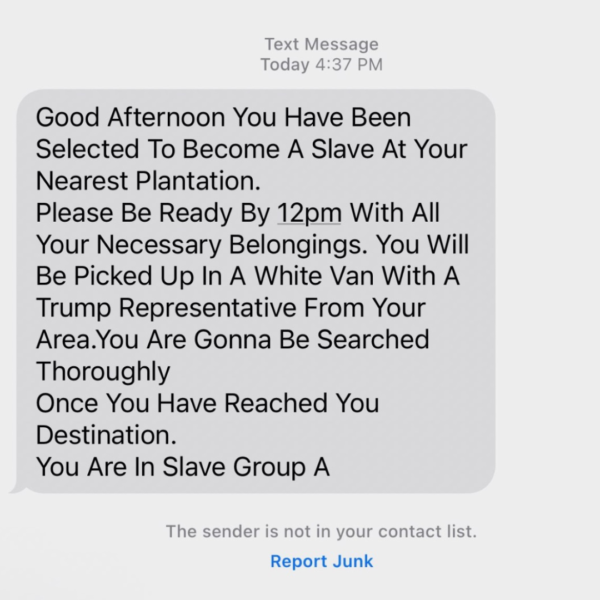News
ABS, WashU respond to racist text messages after election, discuss combating hate

The FBI is investigating racist text messages that have been sent to a number of Black Americans after the 2024 election— including some WashU students. (Courtesy of the Association of Black Students)
The day after the 2024 presidential election, several WashU students, all of whom are Black, received explicitly racist text messages asking them to report to the “nearest plantation” from an unknown source.
The texts sent to members of the WashU community mirror those received by other St. Louisans and Black Americans across the nation. The FBI immediately opened an ongoing investigation into the texts.
For junior Da’juantay Wynter, president of WashU’s Association of Black Students (ABS), these texts, and the hateful ideology behind them, has sparked the organization to take further action.
“[ABS is] definitely thinking of ways to combat this hate, strategically and intentionally,” Wynter said. “Because I hate to say, this won’t be the last time.”
A member of the ABS executive board received one of these text messages, which said that a van would arrive the following day to bring them to the nearest plantation. The member who received the text declined to be interviewed by Student Life.
“Good afternoon, you have been selected to be a slave at your nearest plantation. Please be ready by 12 p.m. with all your necessary belongings,” the text read. “You will be picked up in a white van with a Trump representative from your area. You are gonna be searched thoroughly once you have reached your destination.”
A spokesperson from the Trump campaign told CNN that they had “absolutely nothing to do with these text messages.”
Other university students across the country, including those at Missouri State University and University of Missouri–Columbia, reported receiving similar racist messages. According to an FBI statement, LGBTQ+ students may have also received texts about “re-education” camps.
National reports indicate this was a widespread phenomenon impacting Black people in over 30 states. The texts seem to primarily target a younger demographic including students as young as middle school. Some adults also reported receiving the messages as well.
“I’m not sure how many students at WashU directly got it,” Wynter said. “I only heard of a couple students, but just the fact that it’s happening nationwide is so shameful.”
It remains unclear who distributed these messages or how they obtained the contact and demographic information of those targeted. Initial news reports suggest the culprit used a popular mass texting platform called TextSpot and that they reside in the Philadelphia area.
Federal law enforcement authorities have not confirmed that TextSpot was the platform used to send the messages.
Geoff Ward, Director of the WashU & Slavery Project and professor of African and African American Studies (AFAS), wrote in an email that there is a precedent for hate speech to take place via text.
“Racist hate speech in text messaging is hardly new,” Ward wrote. “Various investigations have exposed the exchanges of similar content, often in the form of racist jokes, among police, court officers, students, and others in recent years.”
Ward wrote that consolidated efforts to distribute racist messaging on a large scale is also nothing new. A three-year WashU research study published in 2023 that Ward co-authored with David Cunningham, a WashU professor of Sociology, found that newspapers were historically used as a means to circulate racist sentiment and messaging.
“The n-word was printed in American newspapers nationwide millions of times between the 1830s and 1960s,” Ward wrote.
He drew a connection between historic and current racist messages sent via text and newspapers, saying that they appear to be of a similar spirit, although the texts are still being investigated.
Julie Flory, Vice Chancellor for Marketing and Communications, condemned all racism on WashU’s campus and promised to maintain anti-racist efforts in a written statement to Student Life.
“We were deeply troubled and saddened to learn about the hateful, anonymous text messages,” Flory wrote. “We’ve offered support to the students who reported to us that they had received these messages and want to assure our entire community that there is no place at WashU for this type of harassment or intimidation.”
Senior Paul Scott, ABS Political Chair, said that although ABS has been in contact with Student Union and upper-level administrators, conversations with administrators have not led to any specific actions taken to support students affected by this issue.
“Ideally, the administration would have made a more direct statement preemptively,” Scott said. “I think it’s powerful when the University shows up and lets students know they are supported in times like these … and obviously there has yet to be a statement or any actionable steps on this particular issue that we know of.”
Wynter affirmed that ABS plans to continue its mission of ensuring that Black students feel safe and included on campus, specifically by increasing collaboration with WashU administration during the following semester.
“ABS is always against hate [towards] anyone, but especially [hate] against our own black students, and we will continue to work very hard to ensure that we are protected, heard, and felt on this campus,” he said.
